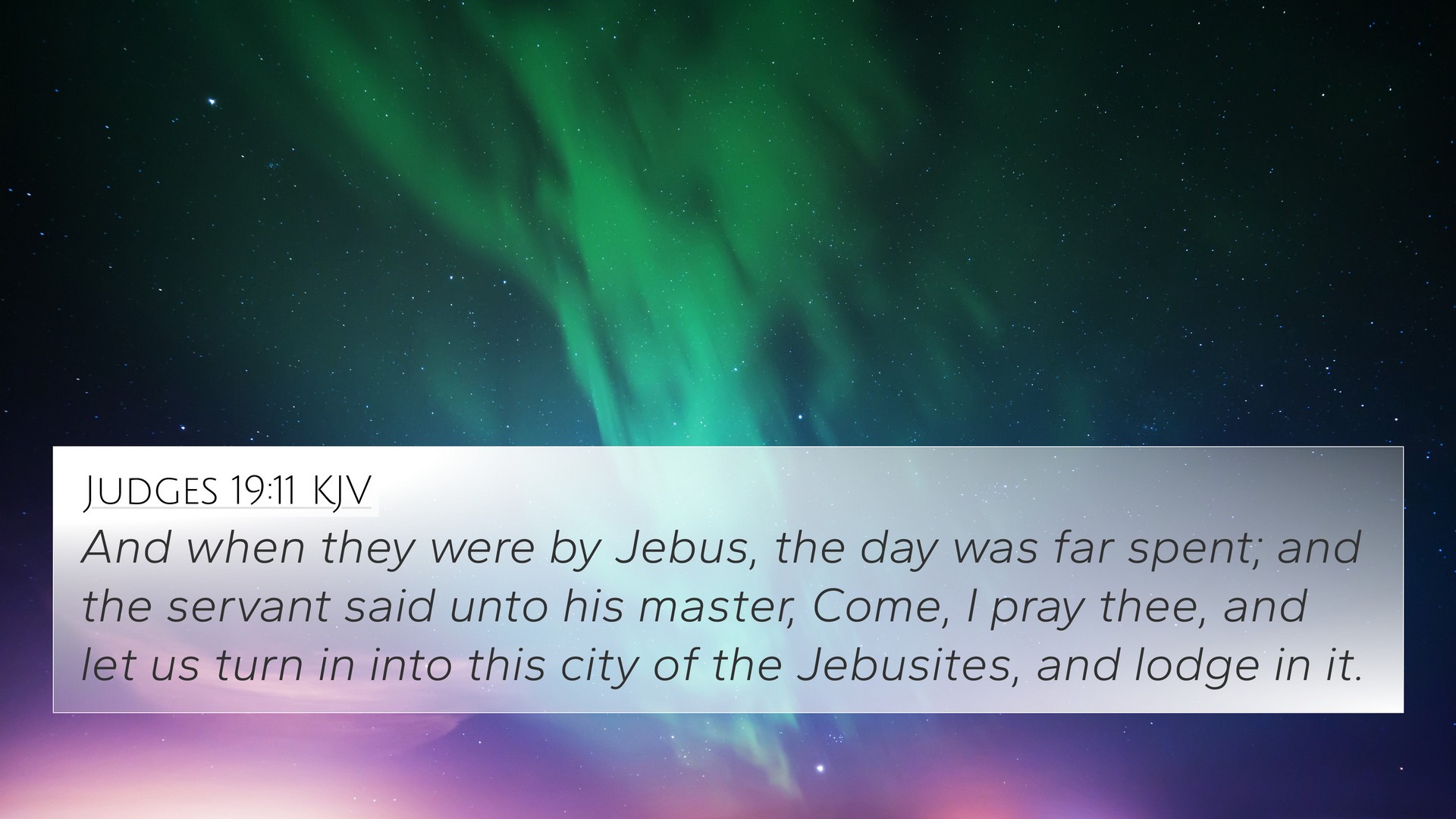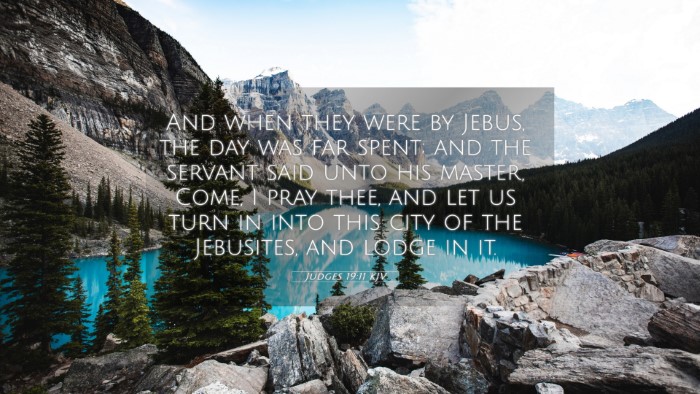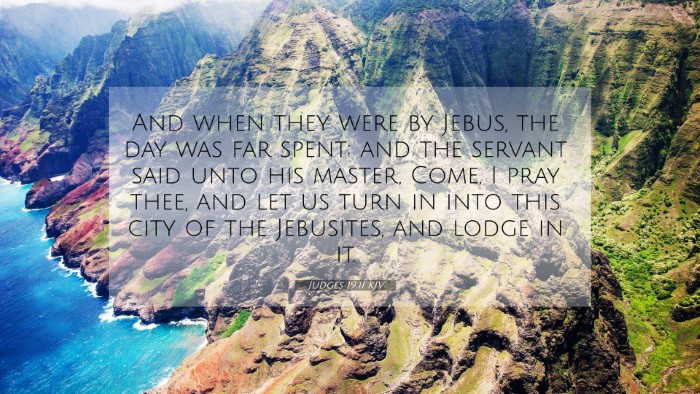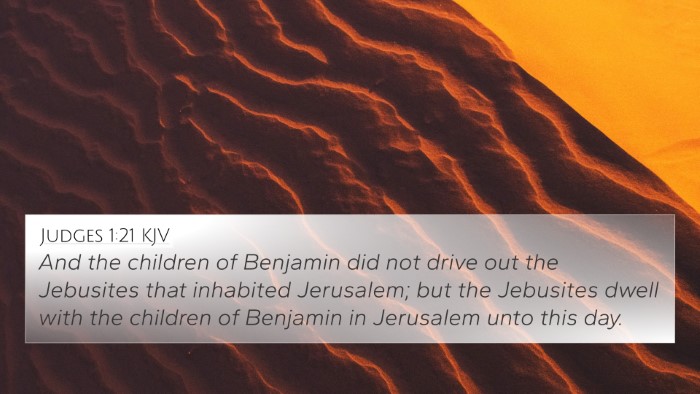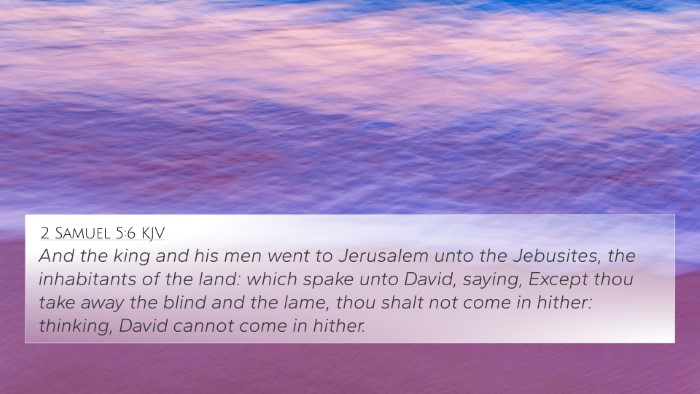Understanding Judges 19:11
Judges 19:11 states: "And when they were by Jebus, the day was far spent; and the servant said unto his master, Come, I pray thee, and let us turn in into this city of the Jebusites, and lodge in it." This verse sets the stage for a narrative filled with significant themes of hospitality, danger, and moral decline within the context of Israelite society.
Summary of Interpretations
This verse illustrates the journey of a Levite and his concubine who, already facing challenges, are now approaching a city that is not of their own people. The commentary from various public domain sources, such as Matthew Henry, Albert Barnes, and Adam Clarke, highlights several key points:
- Setting the Scene: The mention of Jebus (later known as Jerusalem) underscores a geographical and cultural tension. It was a city inhabited by the Jebusites, reflecting a place of foreign influence amidst Israel's territory.
- Timing is Key: The phrase "the day was far spent" carries significant meaning. It highlights the urgency and danger of nightfall for travelers, a theme that reverberates throughout scripture regarding hospitality and safety.
- Desire for Hospitality: The servant’s suggestion to seek refuge in Jebus raises questions about the willingness of the Israelites to seek shelter among those outside their covenant community and what this indicates about their moral standing.
- Foreshadowing Events: This verse serves as a prelude to the tragic events that follow, illustrating how societal issues such as the lack of hospitality lead to dire consequences.
Bible Verse Cross-References
In order to fully appreciate the implications of Judges 19:11, we can explore several related references throughout the Bible:
- Genesis 19:1-3 - The story of Lot and the angels emphasizes the importance of hospitality and the dangers associated with neglecting it.
- Leviticus 19:34 - This passage commands the Israelites to love the stranger, reflecting the call for a people of God to show compassion.
- Hebrews 13:2 - Encourages hospitality, grounding it in the notion that entertaining strangers could lead to divine encounters.
- Matthew 10:14 - Jesus’ instruction about how to treat those who do not receive the message of the gospel correlates with the consequences faced in Judges.
- 1 Peter 4:9 - Encouragement for believers to show hospitality without grumbling captures the essence of communal living against societal decays.
- Acts 16:15 - The reception of Lydia demonstrates the positive effects of hospitality in the early church context.
- Luke 10:7 - Jesus’ directive to his followers to remain in houses that receive them speaks to the essential nature of communal bonds.
- Proverbs 21:13 - This verse warns against ignoring the cries of the poor, which can draw parallels to the neglect seen in Judges.
- Jeremiah 22:3 - A call to justice and relief for the oppressed emphasizes how societal justice is paramount for God’s people.
- John 13:34-35 - Jesus provides a new commandment to love one another, which is essential in understanding connections between hospitality and love.
Thematic Bible Verse Connections
Judges 19:11 serves as a microcosm of broader biblical themes that can yield profound insights through comparative Bible verse analysis:
- Hospitality: Many scripture references highlight the cultural expectation of hospitality among Israelites, rooted in their covenant identity.
- Safety on Journeys: Travelers in ancient times relied heavily on the hospitality of others, and their experiences often mirrored spiritual journeys.
- Moral and Social Decline: This narrative illustrates how societies impacted by outside influence can lead to harm and moral decay.
- Divine Judgment: Biblical narratives often frame hospitality and justice as criteria for God’s blessing or judgment, leading to further theological implications.
- Community Identity: Understanding one's community plays a vital role in biblical teachings about belonging, safety, and divine providence.
Exploring Inter-Biblical Dialogue
The connections between Judges 19:11 and its cross-references deepen the understanding of interpersonal and societal dynamics across the scriptures. As scholars explore links between the Old and New Testaments, several approaches emerge:
- Identifying Connections: Readers can use tools for Bible cross-referencing to trace themes between different books and authors.
- Thematic Studies: Comparative study of Pauline epistles can shed light on the importance of community and hospitality.
- Contextual Parallels: Comparing narratives in the Gospels with Old Testament teachings enables one to see how themes of love and justice are echoed throughout.
- Cross-Referenced Themes: Exploring how hospitality manifests in both Testaments offers insights into God’s character and expectations for his people.
- Sermon Preparation: When preparing sermons, understanding these interconnections can lead to deeper insights and applications for modern audiences.
Conclusion
In conclusion, Judges 19:11 stands as an important verse that invites both reflection and action. By utilizing comprehensive Bible cross-reference materials and understanding thematic connections, readers can gain a richer perspective on the text's implications for both ancient and contemporary contexts.
